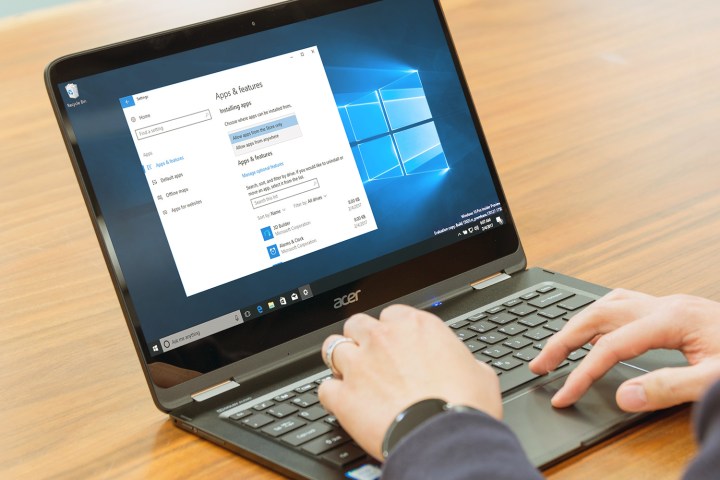
Windows 10 Cloud is an “adaptive shell” for competing with Chromebooks

The goals for Windows 10 cloud appear to be twofold.
First, to create what is rumored to be an adaptive shell for the Windows OS that will allow the operating system to be used on far more than desktop PCs and Surface tablets. Microsoft wants to bring the Windows 10 experience to mobile devices, consoles (like the Xbox One), embedded devices, and even VR/AR. Basically, it’s a way to push Windows onto things it cannot currently run on, including devices from other brands. One of the strengths of this shell is that it could be adapted to fit many different screen sizes and other requirements.
Microsoft has pursued this goal for a long time, and made progress towards it. The both the Xbox One and Windows Mobile currently run a version of Windows 10. However, Microsoft wants Windows 10 to be adaptive in such a way that it can push a Windows 10 update to all devices and expect it to run well, with little to no tweaking. That’s not how it works right now, which is why Windows 10, Windows 10 Mobile, and Xbox One get software updates on different schedules.
Second, Microsoft wants to compete more directly with the immensely popular Chromebook market. Chromebooks are doing very well among certain buyers because they are lightweight, highly affordable, and ditch internal storage for a cloud-based approach to data management. There are definite signs that Microsoft wants to enter this sector, and Cloud is its opportunity. Yes, that means we could be seeing a new category of low cost, low storage laptops running a version of Windows 10, similar to Chrome but with Edge and Windows apps instead.
It’s not a “cloud-based” operating system, like Chrome OS
Given the name, you could be forgiven for thinking Windows 10 Cloud will lean on connected applications and features, as does Google’s Chrome OS. But that doesn’t seem to be the case.
Leaked copies of Windows 10 Cloud show no indication that they’ll be any more reliant on the internet than other versions of Windows. Instead, it appears the “Cloud” designation is being used as marketing short-hand for “the cheapest version.”
This could change, as there’s months to go before Cloud is introduced. But that’s actually not long in the world of OS development. And it seems unwise for Microsoft to invest significantly in changes to a version of Windows 10 it may end up giving away to manufacturers for free, or at a very low price. For those reasons, we think the Cloud designation is fluff.
Cloud will be compatible with mobile ARM processors
It is likely that Windows 10 Cloud will be able to run on mobile ARM processors. We know that this has been a stated goal from Microsoft (after the failure of Windows RT, the company clearly wants a do-over on this front), as a way to spread the OS to devices and platforms where it currently doesn’t exist. Cloud appears to be the best opportunity to create an ARM-compatible OS for this specific purpose.
The only leaked version of Cloud that we have found so far runs on Intel processors. However, noting the “adaptive shell” properties of Cloud, it could simply be a version made with desktops in mind, and mobile ARM versions of the operating system could also exist.
Microsoft also made a joint announcement with Qualcomm at CES 2017, stating it wants to enable “cellular PCs” with a version of Windows running on an ARM chip, and a built-in mobile data modem. This would seem to align with the capabilities and target market of Windows 10 Cloud.
Cloud is focused on newer services Microsoft wants to push
Microsoft has several new Windows 10 features that it’s very proud of, such as Edge and Cortana. It sees these services as the future of Windows and wants to encourage as much adoption as possible. Rumors state that Cloud is intended to push these new services more directly. This would also fit in well with the Chromebook-like focus on cloud capabilities and going online to complete tasks. By putting Edge, Cortana, Office360, and other features front and center, Microsoft hopes to make them more popular.
Windows 10 Cloud has a light footprint, but appears to have a similar interface
When we investigated the leaked version of Cloud, we found that it looked largely the same as the desktop version. If you’ve experienced Windows 10 on desktop, you probably know what to expect—at least with the adaptation that we saw. This should be welcome news for those of use who may want to use Cloud. Microsoft isn’t carving up Windows 10 into some unrecognizable monstrosity.
Windows 10 Cloud will be locked to the Windows Store—or will it?

The big news from the Cloud rumors is the report that Cloud will be “locked” to the Windows Store. In other words, you wouldn’t be able to use any apps except those offered on the Store. This has caused a lot of apprehension, because it sounds both plausible and incredibly annoying. However, there’s no firm evidence yet to back it up.
Even the leaked build we had access to appeared divided on the issue. On one hand, whenever we tried to load and use an app originating from outside the Windows Store, we couldn’t do it. On the other hand, in settings we saw an option that allowed the build to switch back and forth from “Allow apps from the Store only” to “Allow apps from anywhere.” This didn’t appear to have any effect, but the fact that it’s built into the settings is telling. Is this just a feature for a developer build? Will it make it to the final versions of Cloud? It’s a little too early to tell for now.
The Cloud version may be able to run at least some “desktop only” apps

Another common report says that desktop versions per-Cloud won’t be able to run correctly on Cloud because of the APIs used for Windows 10. From what we’ve seen of the leaked version, you may be able to run desktop apps from previous Windows 10 builds, but with a caveat. You have to convert them, and they still may not run correctly. We tried it with EdgeTile and the Desktop App Converter tool, and received the warning, “The app you’re trying to run isn’t designed for this version of Windows.” EdgeTile still worked, but the fact that this warning exists also shows a lot.
Cloud may provide an option to upgrade to full Windows 10
Another rumor suggests that coding details support an upgrade from Windows 10 Cloud to Windows 10 Pro. From one perspective this does make sense — it lets Microsoft make more money with by upselling. But we’re not sure how it would work out. For example, if you bought a Chromebook-like Windows Cloud computer, it likely wouldn’t have the requirements to upgrade to a full version of Windows, even if you wanted to. This is even more true of Cloud on mobile devices. So if an upgrade is in the cards, it will probably be very limited.
Editors' Recommendations
- The next big Windows 11 update has a new hardware requirement
- Microsoft finds a sneaky way to slip more ads into Windows
- The Windows 11 Android app dream is dead
- Microsoft may fix the most frustrating thing about Windows updates
- A new Windows 11 hardware system requirement may be incoming




